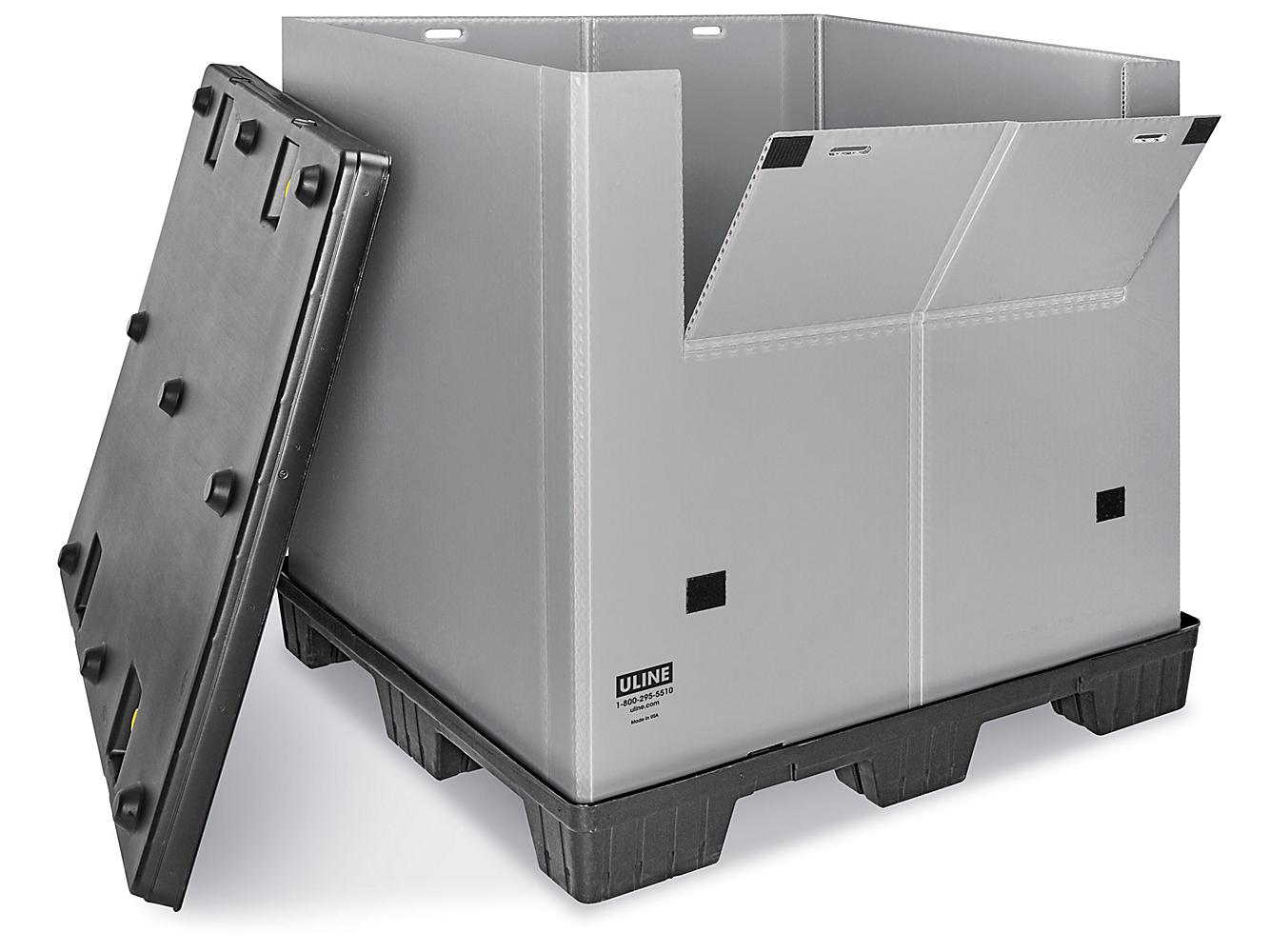The Function of Mass Plastic Containers in Effective Recycling Practices and Sustainability
Mass plastic containers are integral to contemporary reusing initiatives. Their layout improves the performance of product collection and transport, contributing to sustainability goals. These containers not only optimize room yet likewise aid in monitoring contamination degrees. Nevertheless, their implementation is not without difficulties. Understanding the full range of their effect exposes a complex connection in between logistics and ecological duty that necessitates more expedition.
Comprehending Bulk Plastic Containers
Mass plastic containers serve as a crucial element in various markets, promoting the storage and transportation of goods. These containers are commonly made from durable materials such as high-density polyethylene (HDPE) or polypropylene, which offer durability and resistance to ecological factors. Their style frequently includes features like stackability and modularity, permitting reliable use space during both storage and transit.
Industries such as agriculture, food handling, and making often utilize mass plastic containers due to their lightweight nature and ease of handling. The containers can be found in various dimensions and configurations, accommodating the particular demands of various items. Their flexibility prolongs beyond mere functionality; they can additionally be personalized with lids, deals with, and classifying options to improve functionality - Bulk Plastic Containers. Because of this, mass plastic containers play a crucial function in enhancing logistics and supply chain operations across numerous sectors, consequently adding to total efficiency and cost-effectiveness
Advantages of Making Use Of Mass Plastic Containers in Recycling
The application of mass plastic containers considerably enhances the effectiveness of the process when organizations focus on reusing initiatives. These containers are designed to optimize space, enabling for the storage and transport of bigger amounts of recyclable products. This results in less trips to recycling centers, thus minimizing gas usage and associated discharges.
In addition, bulk plastic containers are resilient and resistant to various ecological aspects, ensuring that products continue to be secured throughout handling and transportation. Their light-weight layout even more adds to reduce transportation costs.
Additionally, the uniformity of these containers helps with better sorting and processing of recyclable materials, which can improve general recycling rates - Bulk Plastic Containers. Organizations that take on bulk plastic containers also show a dedication to sustainability, positively affecting their brand image. Eventually, these advantages not just streamline recycling methods but likewise add to broader environmental goals
Just How Bulk Plastic Containers Facilitate Material Collection
Efficient material collection is significantly improved by the use bulk plastic containers, as they supply a reliable and organized solution for collecting recyclable products. These containers are made to suit large volumes of materials, which streamlines the sorting and storage process. Their stackable style takes full advantage of area use, making it simpler for centers to arrange recyclables without mess.
Additionally, bulk plastic containers are sturdy and weather-resistant, permitting for outdoor positioning without degradation. This resilience ensures that materials continue to be safeguarded till they are accumulated for processing.

The uniformity in size and shape of these containers helps with standardization throughout collection points, allowing far better monitoring of recyclable quantities. Their transparent nature allows for very easy presence of materials, aiding in the monitoring of contamination degrees and assuring that only ideal products are collected. Generally, mass plastic containers play an essential duty in streamlining the product collection procedure, consequently advertising efficient reusing practices.
Transportation Efficiency and Environmental Impact
Transportation effectiveness plays a necessary function in the reusing process, particularly with the optimization of lots capability wholesale plastic containers. By making the most of the quantity of product moved, companies can substantially decrease the variety of journeys needed, thereby minimizing their carbon impact. This technique not just improves operational effectiveness but also contributes to more lasting ecological methods.

Enhancing Load Ability
Although optimizing lots capacity is typically forgotten, it plays an important function in boosting transport efficiency and decreasing ecological influence in reusing practices. By taking full advantage of the volume that mass plastic containers can hold, recycling operations can decrease the number of journeys needed for transportation. This not just lowers gas consumption however likewise lowers the deterioration on cars. Effective tons administration allows centers to use room efficiently, making sure that each transport cycle is as efficient as possible. Furthermore, well-optimized tons can cause far better arrangements with logistics companies, potentially lowering overall expenses. Eventually, improving load capacity adds to an extra lasting reusing system by cultivating reliable resource usage and reducing waste created during transportation.
Minimizing Carbon Impact
As recycling operations venture to minimize their environmental influence, lowering the carbon footprint associated with transport emerges as a vital goal. Mass plastic containers play an essential duty in accomplishing this aim by enhancing tons effectiveness and enhancing logistics. Their light-weight yet resilient layout enables maximum freight area application, minimizing the number of journeys called for to carry materials. By combining deliveries, reusing facilities can lower fuel intake and greenhouse gas discharges. In addition, tactically situating recycling centers reduces transport ranges, in addition reducing carbon results. Utilizing fuel-efficient lorries and alternative great site energy resources boosts overall sustainability. By integrating these techniques, the reusing industry can considerably decrease its carbon footprint, adding to a more sustainable future.
Difficulties in the Use of Bulk Plastic Containers

Contamination Problems
Contamination problems represent a substantial challenge in the effective use of mass plastic containers within recycling techniques. These containers frequently accumulate deposits from previous components, causing blended products that can impede the recycling process. Impurities such as food waste, chemicals, or non-recyclable materials can jeopardize the honesty of the whole batch, resulting in increased disposal prices and lowered recycling prices. In addition, improper cleansing or sorting can exacerbate these issues, making it hard for recycling centers to refine products efficiently. The visibility of pollutants not only affects the top quality of recycled items but likewise threatens the overall sustainability initiatives focused on reducing plastic waste. Addressing these contamination difficulties is essential for enhancing the efficacy of mass plastic container recycling.
Recycling Framework Limitations
Ineffectiveness in recycling facilities postures substantial difficulties for the efficient management of mass plastic containers. Lots of reusing facilities do not have the ability to refine big volumes of these containers efficiently, resulting in enhanced prices and delays. Poor sorting innovations commonly lead to contamination, as mass containers might be blended with various other products, complicating the reusing procedure. Limited transport choices additionally impede the movement of bulk plastic containers to proper reusing facilities, resulting in enhanced landfill waste. Additionally, a lack of standard protocols for bulk container reusing creates complication amongst organizations and customers, further complicating efforts to advertise sustainability. Attending to these facilities constraints is necessary to enhance recycling techniques and make best use of the potential of mass plastic containers in a round economic climate.
Finest Practices for Executing Mass Plastic Containers
They need to focus on a tactical approach that enhances performance and lowers contamination dangers when companies consider executing bulk plastic containers in their recycling practices. First, choosing the proper container dimension and kind is vital to suit the volume of materials being processed. Organizations should likewise develop clear labeling and signs to guide customers on proper disposal techniques, decreasing confusion and errors. Routine training sessions for staff can better strengthen these practices, making certain every person recognizes their functions in preserving reusing honesty.
Additionally, organizations should execute a routine maintenance routine to check and tidy containers, protecting against the accumulation of impurities. Partnering with neighborhood recycling centers can likewise improve the collection index process, making sure that products are properly processed. Lastly, companies ought to check and evaluate their recycling metrics, utilizing this data to improve techniques with time and advertise continual renovation in their sustainability initiatives.
The Future of Bulk Plastic Containers in Sustainable Practices
As companies increasingly focus on sustainability, the role of bulk plastic containers in recycling techniques is established to develop considerably. Technologies in materials science are bring about the growth of recyclable and eco-friendly alternatives, boosting the environmental advantages of bulk plastic containers. Additionally, the implementation of closed-loop systems will permit much easier collection and repurposing of these containers, lowering waste and resource intake.
Technical innovations, such as clever radar, will enable business to keep track of the lifecycle of bulk containers, boosting efficiency in recycling processes. As consumer need for sustainable techniques grows, businesses will likely take article on bulk plastic containers made for reuse and lasting value. Additionally, partnership in between federal governments and sectors will cultivate the establishment of standard recycling methods, making sure that mass containers are successfully incorporated right into wider sustainability initiatives. Generally, the future of bulk plastic containers shows up encouraging, with considerable potential for adding to a circular economic climate.
Regularly Asked Questions
How Are Mass Plastic Containers Made and What Materials Are Made use of?
Bulk plastic containers are normally made from high-density polyethylene (HDPE) or polypropylene (PP) These products are processed via shot molding or blow molding strategies, leading to durable, lightweight containers ideal for various storage space and transport needs.
Can Mass Plastic Containers Be Reused Numerous Times Before Recycling?
Yes, bulk plastic containers can be recycled numerous times prior to recycling. Their toughness and layout enable duplicated use in different applications, promoting sustainability and resource performance while decreasing the need for brand-new containers.

What Accreditations Exist for Bulk Plastic Containers in Recycling?
Different certifications for bulk plastic containers include the Recycling Partnership's qualification, the Cradle to Cradle Certified ™ criterion, and the Lasting Product packaging Coalition's guidelines, making certain containers meet particular ecological and recyclability standards for effective recycling.
Just How Do Bulk Plastic Containers Contrast to Other Recycling Storage Space Options?
Bulk plastic containers supply greater toughness and capacity contrasted to other recycling storage space options, minimizing the danger of contamination and helping with reliable transportation. Their layout sustains better organization, improving total performance in recycling procedures.
What Is the Life-span of a Bulk Plastic Container in Recycling Processes?
The life-span of a mass plastic container in reusing procedures commonly ranges from 5 to one decade, depending upon use, material high quality, and environmental conditions, enabling multiple cycles of use prior to ultimate disposal or recycling.
When companies focus on reusing efforts, the use of mass plastic containers greatly boosts the effectiveness of the procedure. Transport efficiency plays a crucial duty in the reusing procedure, especially via the optimization of lots ability in mass plastic containers. The use of mass plastic containers in recycling practices faces considerable challenges, especially worrying contamination concerns and restrictions within reusing framework. Contamination concerns stand for a substantial obstacle in the effective usage of mass plastic containers within recycling practices. When companies consider executing mass plastic containers in their recycling methods, they should prioritize a critical method that improves effectiveness and lowers contamination threats.